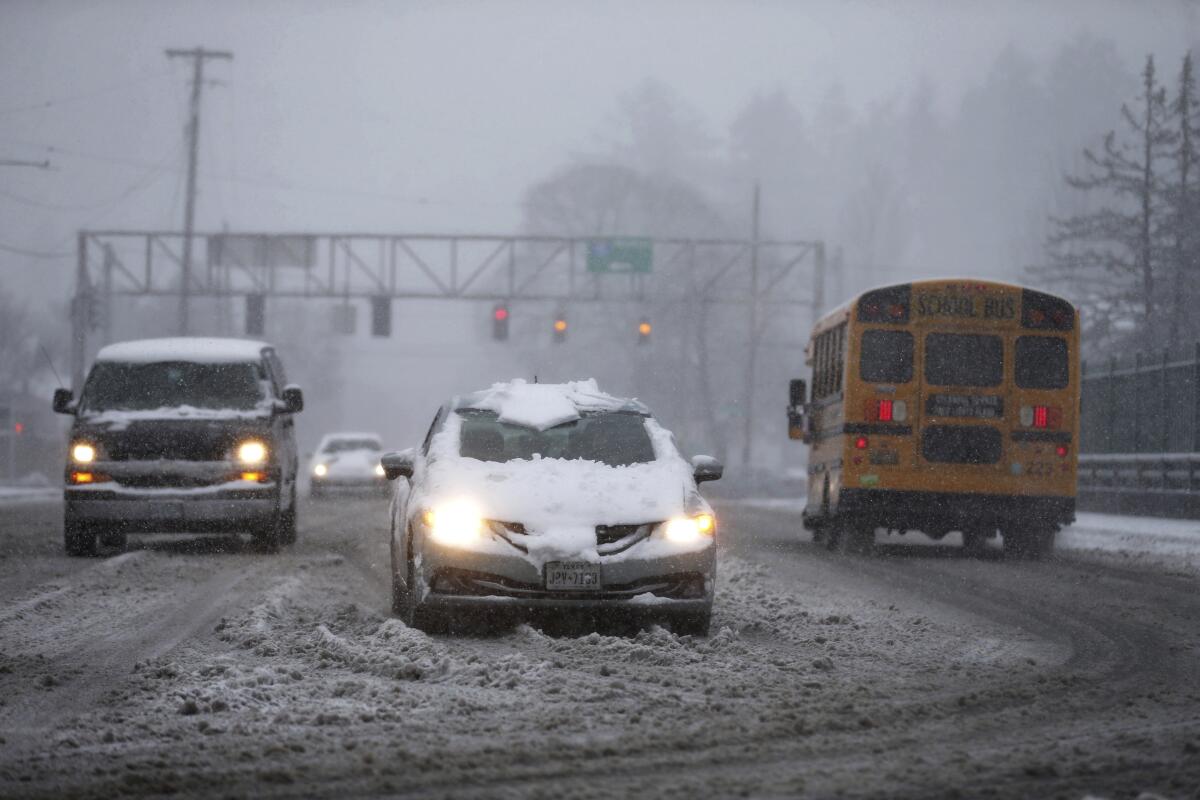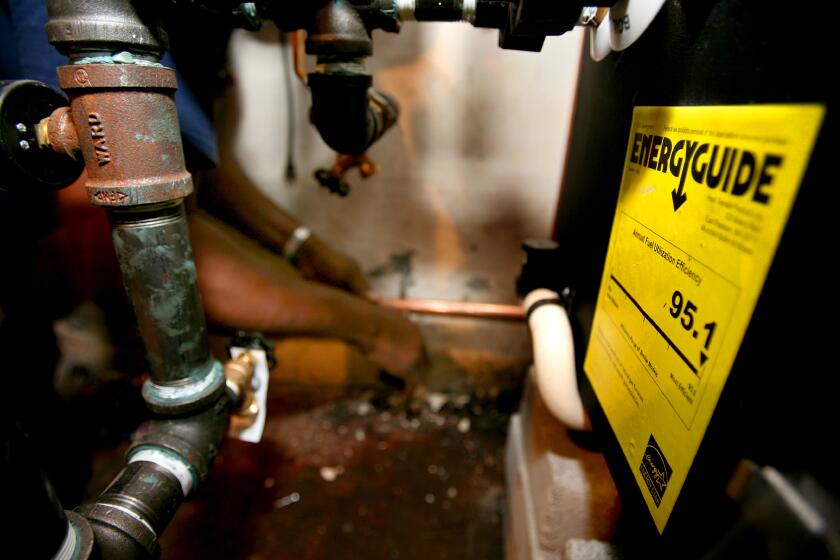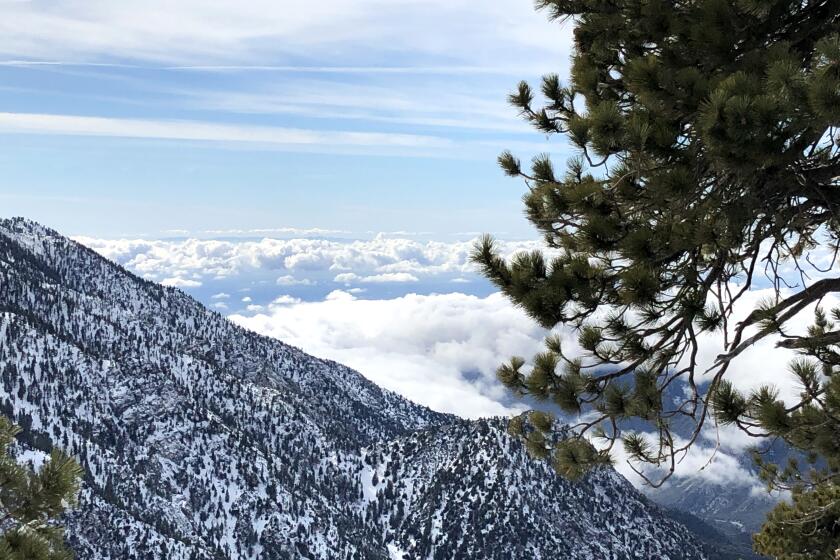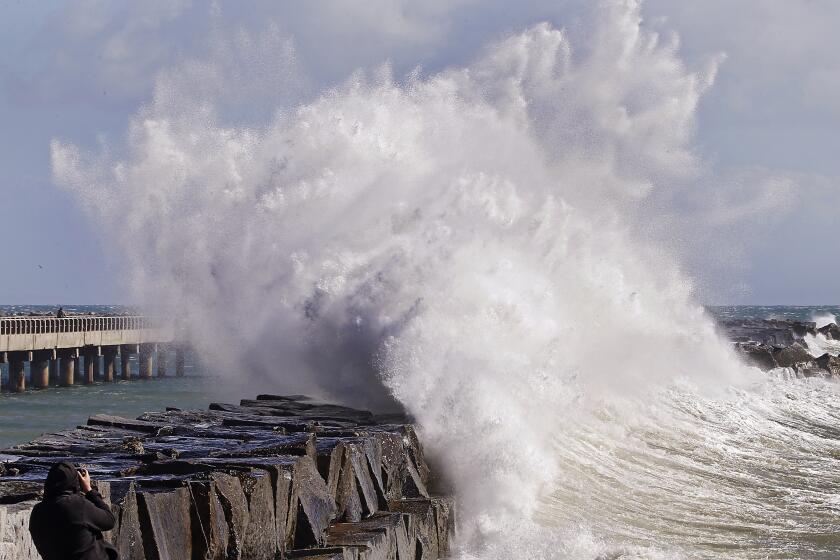Winter storms sow more chaos and shut down much of Portland

- Share via
PORTLAND, Ore. — Winter storms sowed more chaos across the U.S. on Thursday, shutting down much of Portland with almost a foot of snow and paralyzing travel from parts of the Pacific Coast all the way to the northern Plains.
The nearly 11 inches that fell in Portland amounted to the second snowiest day in the city’s history. It took drivers by surprise, stalling traffic during the Wednesday evening rush hour and trapping motorists on freeways for hours.
Some spent the night in their vehicles or abandoned them as crews struggled to clear roads. Other commuters got off spun-out buses and walked in groups to safety. The National Weather Service, which had predicted a slim chance of significant snow, planned to review its work.
The weather also knocked out power to almost a million homes and businesses in multiple states, closed schools and grounded or delayed thousands of flights. The system even brought snow to usually balmy Southern California.
Kim Upham endured a 13-hour ordeal as snow brought to a standstill the traffic on U.S. 26, a mountainous highway that connects Portland to the coast. Already treacherous because of its steep grade, the highway was covered in a sheet of ice, forcing some drivers to leave their cars in the middle of the road.
With natural gas prices still high, California residents must choose between staying warm and paying up during an extended cold spell.
“It was so scary to have semi-trucks behind you and semi-trucks in front of you, and you know you’re on a slope,” she said.
As the hours stretched on, some drivers began to worry about surviving until morning. Upham used a blanket to stay warm and spent the night in her car. To save gas, she turned the vehicle on only intermittently to run the windshield wipers and inch ahead when traffic moved slightly.
“I really don’t want to die on 26,” she said. “I was thinking that quite often, to be honest with you.”
The Multnomah County medical examiner’s office said it was investigating a suspected hypothermia death related to the storm. The agency offered no details.
Amid concern for the thousands of people who live on Portland’s streets, city and county officials said they would open three additional overnight shelters Thursday evening, for a total of six. The sites would be able to sleep about 700 people.
Forecasts show Southern California mountains could get 6 inches to 5 feet of snow by Saturday, but some of the highest peaks could get up to 8 feet.
Some Portlanders reveled in the surprise day off in a place that rarely gets measurable snow.
Joan Jasper snapped on skis and was gliding through a residential neighborhood.
“They always have like ‘snowmageddon’ on the news, and so we kind of ignored it — and 11 inches later here we are!” she said. “This is gorgeous.”
In Southern California, the weather service office in San Diego issued its first-ever blizzard warning, covering the mountains of San Bernardino County from early Friday until Saturday afternoon. San Bernardino County lies east of Los Angeles County, where the first mountain blizzard warning since 1989 was scheduled to take effect at the same time.
Karen Krenis was driving to a pottery studio in Santa Cruz when she stopped in her tracks after seeing snow on the beach. She got out of her car and went to take photos. By the time she left, about 50 other people were there. Adults were snapping photos, and children were making snowballs.
“I have lived in California for 30 years, and I’ve never seen anything like it,” Krenis said.
Snow has already started to fall in the Antelope Valley, and forecasters are warning of possible dangerous conditions that could last through Sunday.
In Wyoming, roads across much of the southern part of the state were impassable, state officials said.
Rescuers tried to reach people stranded in vehicles, but high winds and drifting snow created a “near-impossible situation” for them, said Sgt. Jeremy Beck of the Wyoming Highway Patrol.
In the Pacific Northwest, high winds and heavy snow in the Cascade Mountains prevented search teams from reaching the bodies of three climbers killed in an avalanche on Washington’s Colchuck Peak over the weekend.
Portland residents had expected no more than a dusting to a few inches. The city uses salt on its roads only in extreme situations for environmental reasons, and the chaos Thursday recalled a similar storm in 2017 that left motorists stranded on freeways and shut down the city for days.
The weather service originally predicted a 20% chance that Portland would get more than 2 inches of snow. The probability of getting 6 to 8 inches was only around 5%.
The forecast changed rapidly as the storm approached, said Colby Neuman, a weather service meteorologist in Portland. He said forecasters would try to figure out why their models were wrong.
“There’s a balance there between crying wolf and also informing people so they can make their own decisions,” Neuman said.
In Arizona, several interstates and other highways were closed because of high winds and blowing snow. Forecasters said snow could fall as rapidly as 2 to 3 inches per hour.
A blizzard warning was in effect through Saturday in California for higher elevations of the Sierra Nevada, where forecasters predicted several feet of snow, 60 mph wind gusts and wind chills as low as minus-40 degrees.
Electrical grids took a beating in the north as heavy ice and gusty winds knocked down power lines or fouled them with tree branches and other debris in California.
In southwestern Michigan, a firefighter in the village of Paw Paw died Wednesday after coming into contact with a downed power line, authorities said.
Breaking News
Get breaking news, investigations, analysis and more signature journalism from the Los Angeles Times in your inbox.
You may occasionally receive promotional content from the Los Angeles Times.
Widespread power outages were reported in California, Oregon, Illinois, Michigan and New York, according to the website PowerOutage.us.
The largest outages by far were in Michigan, where more than 820,000 customers were without electricity, mostly in the state’s southeast corner. Power lines and trees were shrouded in ice. DTE Energy said some outages could last through the weekend.
Afternoon temperatures in the 40s were expected to melt the ice, but DTE said it was bracing for more broken lines.
“A quarter-inch of ice on an electrical system is the equivalent of a baby grand piano hanging on those wires,” said Trevor Lauer, the president of DTE’s electric arm.
In the Detroit suburb of Dearborn, the city offered free dry ice, an acknowledgment that power could be out for a while. Ash Quam praised a public works crew for getting a large ice-coated tree limb out of the street.
“It was so loud when it came crashing down around midnight. By the time I woke up this morning, it was gone,” Quam said on Facebook.
Weather also contributed to another day of problems at the nation’s airports. By Thursday afternoon, more than 2,000 flights were canceled and nearly 14,000 were delayed across the country, according to the tracking service FlightAware.
More to Read
Sign up for Essential California
The most important California stories and recommendations in your inbox every morning.
You may occasionally receive promotional content from the Los Angeles Times.













